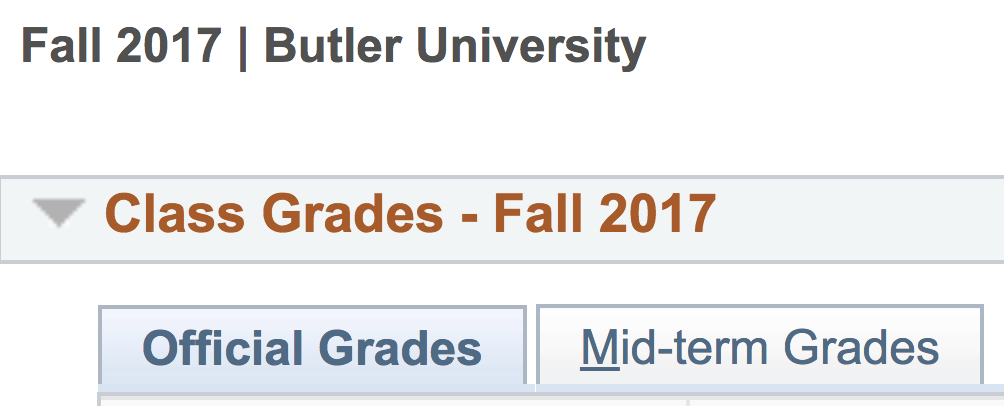Midterm grades can be found next to official semester grades on My.Butler.
JACKSON BORMAN | STAFF REPORTER | jborman@butler.edu
Butler University is transitioning from early term grades for first-year and sophomore students to standard midterm grades for all students. The change comes because of problems with the old early term grade system. The new midterm grades will no longer have the option for professors to give comments or suggestions related to students’ work in class.
Michele Neary, registrar in the Office of Registration and Records, is one of the people who was in charge of the switchover. She explained in an email that the the old program for early term grades was at Butler before Moodle and that it makes more sense for Moodle to be the primary system that professors use to connect with students.
“The Early Term Grade process was a customized process created before Butler adopted a Learning Management System,” Neary said in an email. “With Moodle in place, instructors are now able to provide relevant feedback to students in a more timely manner. The resources required to maintain the ETG-customized process were quite extensive as it had to be retrofitted each time a new system upgrade was applied, which happens approximately four times a year.”
The system had to be retrofitted because the early term grade function was a customized process, not supported by Butler’s student information system. The new midterm grade reports are supported by the system.
Stuart Glennan, associate dean of the college of liberal arts and sciences, thinks the old system, on top of being a hassle to continuously update, is outdated.
“When this [early term system] first happened, there was no Moodle, there was no online gradebook. There was email, but it wasn’t used very often,” Glennan said.
Professor Margaret Brabant is the political science department chair. She thinks this change is detrimental to students and keeps professors from helping students like they should.
“All we are going to be allowed to do is enter a letter grade,” Brabant said. “The problem with that, for me, is that I want to be able to communicate with my students something like ‘Outstanding work’ or the specifics of ‘Utilize the math lab.’”
In an email sent to faculty regarding the changes in the midterm grades, professors were told that if they wish to communicate to their students anything more than the midterm letter grade, they should do so through other means.
Glennan said he does not see the change as a big deal because not all professors used the old comments section in the first place.
“The system wasn’t being used completely,” Glennan said. “Some people use it and some people don’t. Given that there are a lot of different ways to communicate with students, that loss was worth the gain in terms of broader access.”
Meredith Buganski is a sophomore chemistry and biomedical engineering major. She said that not every faculty member used the comments section in the past but it should be each instructor’s choice.
“I only got comments on my [first year seminar] class last year. My other professors never did that, but I guess if I needed comments that they are nice to have,” Buganski said. “[Professors] should have the option to do it if they want to.”
Brabant was one of the faculty members who used the comments section regularly for early term grades. She thinks that without them, students might be upset that there is no explanation for their grade.
“My concern is over those more nuanced remarks; we can still make them, but it is just another step for the faculty member,” Brabant said. “A letter grade, especially a bad one, has the potential of really upsetting students.”
Elliott Reising, sophomore exploratory studies major, said teachers’ comments were not necessarily helpful for him, but other students might need them.
“Last year it was nice to see the comments, but I never really acted on them,” Reising said. “I never had a teacher say come see me or anything like that, but it was still nice to see the comments there.”
Overall, Brabant said the changes made will not be for the better.
“I think this is going to cause more confusion, more anxiety, than this wonderful system [that we used to have],” Brabant said. “One step forward, we are going to give everybody midterm grades, but then [we are] stepping backwards because we are taking away this ease for [the faculty].”
Brabant said that faculty members were not given an explanation on why the changes were made to the system that seemed to be working just fine as it was. Brabant wants to urge students to not be afraid to ask for help.
“For whatever reason, this is the new policy,” Brabant said. “Students, please do not hesitate to ask your teachers or advisors how you can better your grades.”


